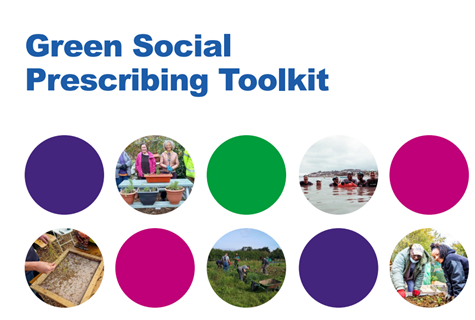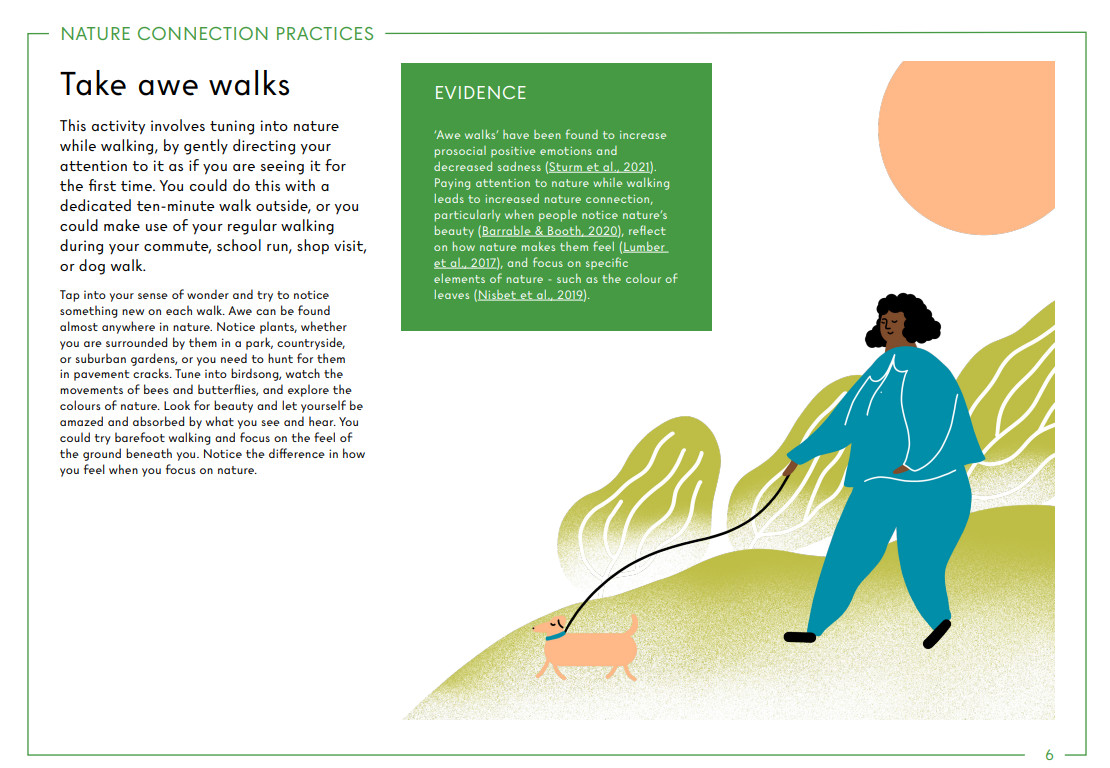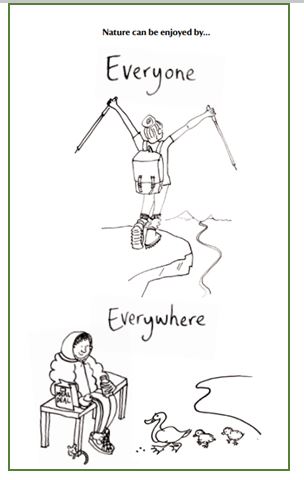Resource Library: Nature and Wellbeing
-
Nature and Wellbeing
How connected we are to nature plays a critical role in our physical and mental health and wellbeing; dozens of studies show that connecting with nature helps people feel good and function well. It’s important to note that connecting to nature can be simple, everyday gestures that can happen in towns and cities, as well as rural places. Simply noticing one good thing in nature, like the clouds passing or birds chirping, each day for a week brings sustained and clinically significant improvements in mental health. By encouraging more people to connect with nature, through activities like community gardening, nature walks, cold water swimming, crafting in nature and far more, we can bring about real positive changes to their lives and the future of the environment.
Amber Marquand - Health and Environment Lead Advisor for Worcestershire, Warwickshire, Birmingham and the Black Country
If you would like to know more about how nature could benefit staff or patients, or how your nature-based interventions could be better linked with the health sector, please get in contact with Amber Marquand - Health and Environment Lead Advisor for the West Midlands at Natural England.
Amber.Marquand@naturalengland.org.uk
Nature connection describes our sense of relationship with the natural world. Not only can nature connectedness relate to how much we care about the natural world, but the more connected we are, the better our physical and mental wellbeing.
Benefits of Nature Connectedness include:
- Reduced depression, anxiety and stress
- Better attention, memory & verbal expression
- Feeling of belonging
- Better sleep & appetite
- Improved wellbeing
I can help you...
- access key resources about nature connection
- learn from case studies and examples of best practice within Green Social Prescribing
- find funding opportunities for nature-based activities
- connect up health professionals and nature-based organisations
- overcome barriers to participation or delivery
Please reach out if you’d like to learn more about how nature can benefit health and wellbeing..
Evidence of Nature for Health and Wellbeing
Evidence of nature for health and wellbeing –
Link to Evidence Repository Natural England Access to Evidence - Search Results page 1.
Examples of evidence produced;
A review of nature-based interventions for mental health care - NECR204 (naturalengland.org.uk)
Links between natural environments and learning: evidence briefing - EIN017 (naturalengland.org.uk)
Green Social Prescribing Toolkit
The Green Social Prescribing Toolkit has been developed share the learning from the 7 Green Social Prescribing Pilot Programmes across England which ran from 2021-2023. The pilots tested the use of nature-based interventions for people with mild to moderate mental health needs, or during recovery from more significant mental illness. Over 8,500 people benefitted from these interventions. The toolkit is designed to help communities, organisations and health professionals who are looking to set up green social prescribing programmes that connect with their local health systems.
It includes:
- Information about specific projects involved in the pilot
- Templates and guidelines for getting started and best practice
- Links to evaluation and research
- Links to other useful resources
For further information click on the link below:
Green Social Prescribing - National Academy for Social Prescribing | NASP (socialprescribingacademy.org.uk)

How the Natural Environment Can Support Health and Wellbeing through Social Prescribing
It is now well-established that humans have an innate need to experience the natural world. This evidence review provides a summary of literature that associates nature exposure with positive physiological and psychological outcomes. This review has a particular focus on nature-based social prescribing interventions. The evidence presented is mostly derived from nature exposure (i.e., proximity, access, frequency, and time spent in nature and/ or quality of nature) rather than research looking at how people feel about their connection to nature or “nature connectedness.
For further information click on the link below:
Nature Connection Handbook
Nature Connection Handbook: a user-friendly guide to increasing peoples’ connection with nature for their health and wellbeing. Developed by the University of Derby and Natural England. It explains what Nature Connection is, why it matters, and how to help people grow closer to nature for their health and wellbeing. The handbook also details several case studies of nature on prescription.
the-nature-connection-handbook.pdf (wordpress.com)
National Trust Handbook - Nature and Me
This Handbook has been developed by the National Trust in partnership with the University of Derby, and details 5 ways to strengthen the relationship between people and nature for their health and wellbeing.
They define 5 broad pathways to engaging with nature in a meaningful way.
- Senses: actively engaging with nature through the senses. For
example, listening to bird song, touching the grass, watching the breeze in the
trees, smelling the flowers.
- Emotion: reflecting on the feelings that nature can inspire
e.g. on a walk, noticing how the surroundings make someone feel.
- Beauty: appreciating the beauty of nature e.g. taking photos
of trees/flowers/birds, creating art using natural materials, cloud watching.
- Meaning: exploring the meaning nature has for
individuals e.g. mapping a bee journey, what they might celebrate about nature
like creating stories that include nature.
- Compassion: recognising we can co-exist with
nature and how we can help it thrive. E.g. planting wildflowers, feeding birds,
litter picking.
- The handbook
also contains lots of ideas about how to use the 5 pathways to connect people
with nature.
The handbook also contains lots of ideas about how to use the 5 pathways to connect people with nature.
For more information click on the image below:
Nature Connection Practices
Nature Connection Practices:
Based on the latest research on human-nature relationships, the Nature Connectedness Research Group at the University of Derby have put together a set of five nature connection practices to help activate the pathways to nature connectedness. Each one takes just a few minutes a day and can be done alongside ordinary daily activities. For instance, several studies have shown that even watching videos of nature for 10 minutes every day can increase nature connection and reduce feelings of stress – imagine the effect nature videos could have on patients in waiting rooms for example.
nature-connection-practices.pdf (wordpress.com)
NHS England - Green Social Prescribing
Green social prescribing is the practice of supporting people to engage in nature-based interventions and activities to improve their mental and physical health. These interventions and activities could include both what is known as green and blue activities, such as local walking schemes, community gardening projects, conservation volunteering, green gyms, open water swimming or arts and cultural activities which take place outdoors. There is strong and growing evidence that nature-based social prescribing plays an important role in improving mental and physical health and reducing loneliness. These activities therefore may be ‘prescribed’ by link workers (and other trusted professionals) alongside other forms of support.
Nature Connected Organisations
A guide for connecting organisations with nature for sustainable futures and workplace wellbeing.
This handbook outlines why nature connection is important for organisations, and offers a framework and tips for bringing nature connection into an organisation. It identifies opportunities for connecting staff with nature, opportunities to develop spaces and processes that are nature connecting, and opportunities for going deeper and growing organisations with nature connectedness embedded into their organisational culture. The guidance will be useful to organisations across sectors.
Please click on the image below to open the guide.
Three Good Things in Nature: A Walking Intervention to Improve Nature Connection and Mental Health
This blog post summarises a research study that looked at the benefits of noticing Three Good Things in Nature during a nature based or urban walk for people living with depression and/or anxiety. Getting people to notice 3 good things in nature is achievable, can be done anywhere and allows people to go on to develop their own practices. Looking out for 3 things like wildflowers, or nature growing up through the cracks in the pavement, listening for birdsong or the wind down the street. These interactions can be recorded by writing them down, or just taking a mental note.
Skip HEALTH AND ENVIRONMENT MONTHLY NEWSLETTERHEALTH AND ENVIRONMENT MONTHLY NEWSLETTER
 Skip Useful Links & Resources
Skip Useful Links & ResourcesWest Midlands Funding Opportunities
Useful Links & Resources
To find out about your local nature based activities and providers click on links below.
Worcestershire:
Community Services Directory - Search nature or gardening or walking or conservation
Herefordshire:
Home - Talk Community Directory - Search nature or gardening or walking or conservation
